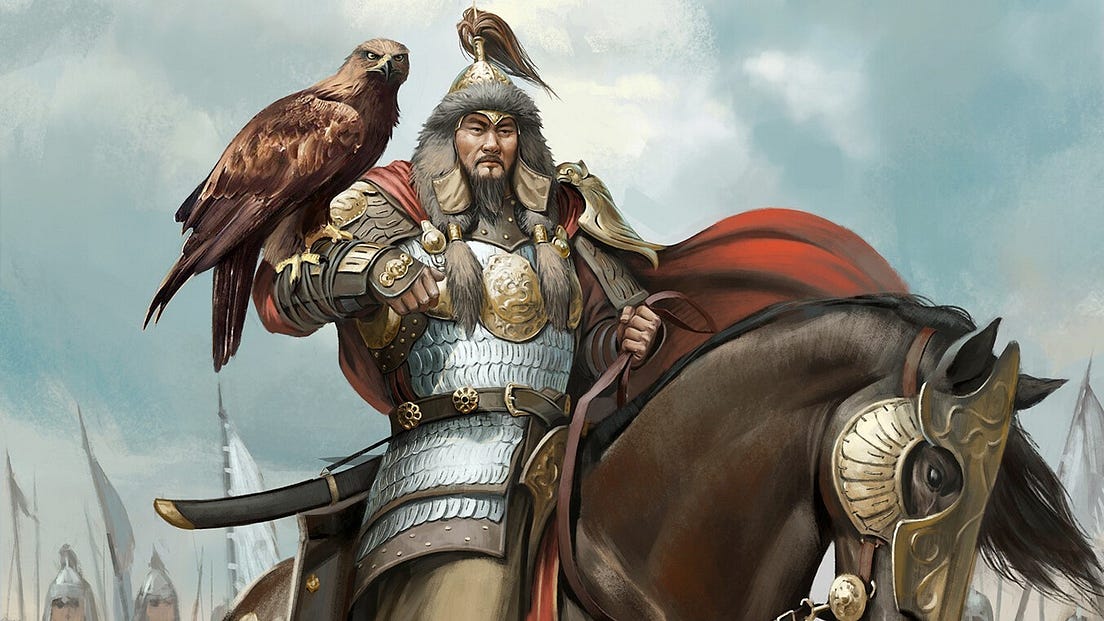Genghis Khan, the enigmatic figure of history, continues to captivate our imagination centuries after his reign. Often depicted as a ruthless conqueror, his legacy extends far beyond mere military conquests. Behind the tales of conquest lies a complex leader whose principles and strategies offer timeless lessons for modern leadership. In this blog, we delve into the life of Genghis Khan, unraveling his leadership style and uncovering the enduring lessons it holds for leaders today.

The Rise of a Legend:
Born as Temüjin in the harsh Mongolian steppes in 1162, Genghis Khan’s early life was marked by adversity. From a young age, he experienced the brutal realities of tribal warfare and betrayal. However, these challenges molded him into a resilient and determined leader.
Temüjin’s transformation into Genghis Khan began with his unification of the Mongolian tribes under his rule. Through a combination of military prowess, diplomacy, and strategic alliances, he forged a formidable force capable of sweeping conquests across Asia and Europe. Yet, it was not brute force alone that propelled him to greatness; it was his visionary leadership and innovative tactics that set him apart.
Leadership Principles of Genghis Khan:
Vision and Adaptability: Genghis Khan possessed a grand vision of a united Mongol empire, but he remained adaptable in his approach. He understood the importance of flexibility in the face of changing circumstances, allowing him to pivot his strategies to suit different situations.
Empowerment and Loyalty: Unlike autocratic rulers of his time, Genghis Khan empowered his subordinates and rewarded loyalty. He fostered a meritocratic system where individuals were judged based on their abilities rather than their lineage, fostering a sense of ownership and dedication among his followers.
Strategic Innovation: Genghis Khan revolutionized warfare with his innovative tactics. He mastered the art of psychological warfare, using fear and intimidation to subdue his enemies. Additionally, he pioneered military logistics, ensuring his armies were well-supplied and mobile, enabling rapid conquests across vast territories.
Cultural Openness: Despite his reputation as a conqueror, Genghis Khan was surprisingly open to foreign cultures and ideas. He encouraged trade and cultural exchange, fostering a diverse and cosmopolitan empire that thrived on innovation and exchange.
Legacy of Leadership: Genghis Khan’s legacy endures not only in the lands he conquered but also in the principles of leadership he embodied. His emphasis on unity, adaptability, and empowerment resonates with leaders across diverse fields, offering valuable insights into effective leadership in the modern world.
Conclusion:
Genghis Khan remains a towering figure in history, revered for his military conquests and feared for his ruthless tactics. Yet, beyond the myths and legends, lies a leader whose principles and strategies continue to inspire and intrigue. By studying the life of Genghis Khan, we uncover valuable lessons in vision, adaptability, and empowerment that transcend time and culture. As we navigate the complexities of leadership in the modern world, let us draw wisdom from the legacy of Genghis Khan, forging a path of resilience, innovation, and unity.
https://en.wikipedia.org/wiki/Genghis_Khan: Ego’s Foe: The Epic Saga of Genghis Khan